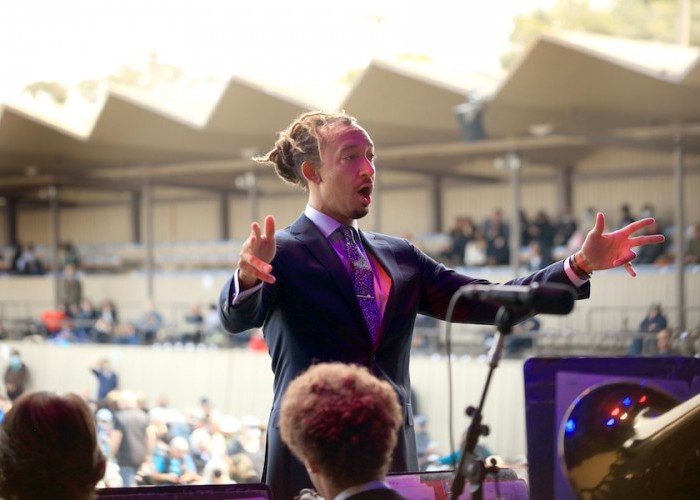Jan 13, 2026 2:09 PM
More Trump-Kennedy Center Cancellations
The fallout from the renaming of the John F. Kennedy Center for the Performing Arts to include President Donald…

Gerald Clayton directs the Monterey Next Generation Jazz Orchestra.
(Photo: Randy Tunnell)Though reduced to just a third of its usual capacity, the 64th Monterey Jazz Festival (Sept. 24–26) somehow pushed all the buttons its faithful audience has come to expect: knockout shows by established stars, appearances by up-and-coming artists, a commissioned new work, the traditional boogie-down Saturday afternoon and you’ll-hear-from-this-one high school talent.
Because of safety concerns, the smaller, essentialized 2021 festival was presented at the Monterey County Fairgrounds on just two outdoor stages: the Arena and the tiny, adjacent Courtyard Stage. And while some fans no doubt missed the more progressive acts that would have played four shuttered venues on the rest of the cordoned-off grounds — never mind the panel discussions, DownBeat live Blindfold Test and wide choice of food booths — this year’s 2,500 jubilant fans seemed to genuinely revel in their first jazz festival since the pandemic began early last year.
Pat Metheny’s new trio Side-Eye with keyboard tyro James Francies and New Orleans drummer Joe Dyson and Herbie Hancock’s touring group with flutist Elena Pinderhughes and guitarist Lionel Loueke got things off to a roaring start Friday night, sowing both excitement and a feeling of humble gratitude at being able to share their music again. Side-Eye played as if ignited by lighter fluid, drawing largely from tunes on its album, Side-Eye NYC (V1.1V). Surrounded on three sides by keyboard stacks, Francies came out of the gate blazing, with grooving bass lines and thunderous, two-handed solos on “Timeline” and “Bright Size Life.” Metheny and the tangy Dyson shattered the metronome in a sizzling duo on “Trigonometry,” and Metheny’s gorgeous, quietly probing acoustic encore “Is This America” capped an inspiring set.
Metheny doesn’t say much on stage, but Hancock engaged the crowd with disarmingly open chatter, even singing his confessionally romantic vocoder hit, “Come Running To Me,” which highlighted the organic fluidity of this working pop/jazz band. Pinderhughes sang moving originals, though her celestially gigantic flute sound is her real calling card. And Loueke’s shimmering, multi-channeled guitar sounds and voice shone on “Secret Sauce.” No Hancock Monterey set would be complete without “Chameleon,” “Cantaloupe Island” and some screaming keytar; Hancock happily obliged the wildly cheering crowd.
Saturday’s highlight was the premiere of Miho Hazama’s new work Exoplanet Suite by her 14-piece m_unit, which features the unusual instrumentation of four reeds, two brass, four rhythm and string quartet. One of the best Monterey commissions in years, the three-part suite showcased Hazama’s cinematic sense of drama, ear for unusual timbres, Stravinsky-inspired meters and Maria Schneider-worthy integration of composed and improvised passages. It justly netted a standing ovation.
Though the sun never broke through the Monterey fog hovering over Saturday afternoon’s boogie-down set, Oakland r&b singer and Monterey veteran Ledisi got the crowd toasty with a set that peaked on her fetching anthem, “Being A Woman.” Monterey’s Next Generation Jazz Orchestra, directed by pianist Gerald Clayton on Sunday, boasts a long list of alums who have gone on to great things, including Pinderhughes herself and keening alto saxophonist Immanuel Wilkins, who along with Bahamian trumpeter Giveton Gelin made for pleasant company at the picnic tables near the Courtyard Stage. This year’s standout student was 15-year-old trumpet player Skylar Tang, from Foster City’s Crystal Springs Upland School (near San Francisco), who showed a maturity of concept far beyond her years.
One of the most highly anticipated bands was Terri Lyne Carrington + Social Science, whose dynamite 2019 album Waiting Game topped in the 2020 DownBeat Critics Poll in several categories. The band’s anti-racist, anti-homophobic messages were welcome and timely — “How long can freedom wait?”— but apart from some poetic pianism from Aaron Parks and searing raps by Kassa Overall, the group’s shape-shifting set felt murky, with Debo Ray’s operatically expressive vocals a particular distraction.
One of Monterey’s signal attributes is the longtime loyalty of an African-American boomer audience, which responded with special delight – though they were certainly not alone – to the greatest-hits closer offered by singer/guitarist George Benson. “Chain Reaction,” “Give Me The Night,” “This Masquerade” and “Turn Your Love Around” propelled hundreds to the grassy area below the high stage, where they danced with abandon.
The success of this year’s smaller festival may be a harbinger of things to come.
“My gut is that COVID will still be around next year,” said Tim Jackson, the festival’s long-time artistic director. “I would say between what you saw in 2019 and what you’ve seen this year – split the difference.”
He added: “I don’t think it will ever be the same as 2019. The festival will evolve.” DB

Belá Fleck during an interview with Fredrika Whitfield on CNN.
Jan 13, 2026 2:09 PM
The fallout from the renaming of the John F. Kennedy Center for the Performing Arts to include President Donald…

Peplowski first came to prominence in legacy swing bands, including the final iteration of the Benny Goodman Orchestra, before beginning a solo career in the late 1980s.
Feb 3, 2026 12:10 AM
Ken Peplowski, a clarinetist and tenor saxophonist who straddled the worlds of traditional and modern jazz, died Feb. 2…

The success of Oregon’s first album, 1971’s Music Of Another Present Era, allowed Towner to establish a solo career.
Jan 19, 2026 5:02 PM
Ralph Towner, a guitarist and composer who blended multiple genres, including jazz — and throughout them all remained…

Rico’s Anti-Microbial Instrument Swab
Jan 19, 2026 2:48 PM
With this year’s NAMM Show right around the corner, we can look forward to plenty of new and innovative instruments…

Richie Beirach was particularly renowned for his approach to chromatic harmony, which he used to improvise reharmonizations of originals and standards.
Jan 27, 2026 11:19 AM
Richie Beirach, a pianist and composer who channeled a knowledge of modern classical music into his jazz practice,…